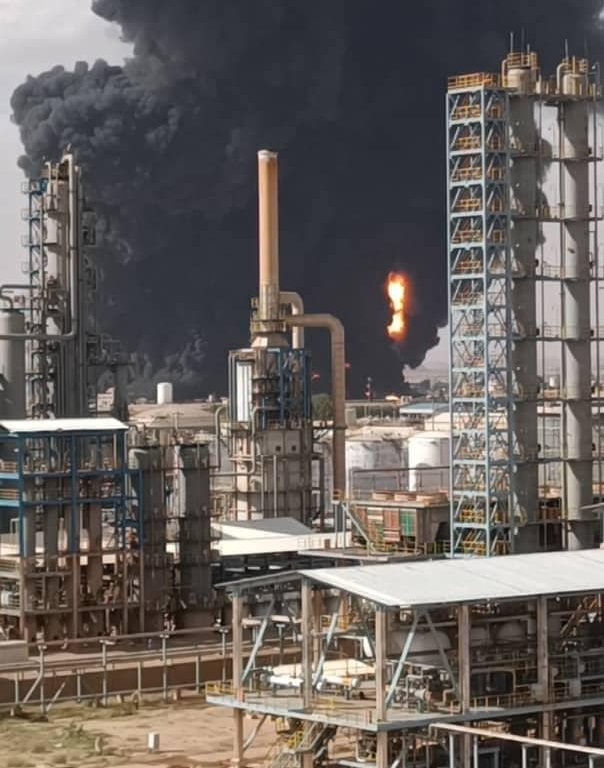Jeili refinery fire engulfs Khartoum in ‘toxic’ smoke

Heavy smoke rises from the offices near the El Jeili refinery north of Khartoum, November 7, 2023 (Photo: SAF)
Thick black and white smoke billowed from the Jeili refinery in Khartoum yesterday morning, spreading over parts of Khartoum North (Bahri) and Omdurman. The Sudanese Armed Forces (SAF) and the Rapid Support Forces (RSF) have exchanged accusations over responsibility for the fire.
A fire broke out at El Jeili oil refinery northeast of Khartoum around 06.00 on Thursday, generating thick smoke that reached the capital’s sister cities Omdurman and Khartoum Bahri.
Experts told Radio Dabanga that the fire involved gas and plastic materials, causing significant smoke emissions. Residents have voiced concerns over the health implications of the fire, while medical authorities have urged the public to wear masks to mitigate potential harm.
Former Undersecretary of the Ministry of Energy Hamed Suleiman warned of the severe health and environmental consequences of the refinery fire. He told Radio Dabanga that the smoke contained harmful gases, including sulphur dioxide, nitrogen oxide, and carbon monoxide, which can cause respiratory issues.
“Exposure to gasoline particles and related compounds could result in long-term damage to the liver, kidneys, and nervous system”, Suleiman warned. Short-term effects include headaches and potential loss of consciousness.
The former undersecretary also expressed concern over the fire’s impact on air, water, and soil, as well as the risk it poses to nearby facilities, such as strategic warehouses, power stations, pipeline stations, distribution companies, and a petrochemical plant.
Exchanging accusations
In a statement yesterday, the Sudanese Armed Forces (SAF) accused its rival, the paramilitary Rapid Support Forces (RSF), of deliberately setting the refinery ablaze in a “desperate attempt to destroy the country’s infrastructure” after failing to seize its resources.
Conversely, the RSF alleged that Sudanese Air Force bombed the refinery with barrel bombs, destroying critical facilities. The RSF described the attack as a “war crime” and a violation of international humanitarian law.
Basha Tebeig, an advisor to the RSF commander Mohamed ‘Hemedti’ Dagalo, called the incident a “systematic attack” on Sudan’s infrastructure. He accused SAF warplanes of targeting the refinery, describing it as a breach of the rules of warfare that prohibit targeting civilian and strategic facilities, in a post on X.
Sudan’s Emergency Lawyers group held both parties responsible for the fire, saying it “violates the economic and social rights of the Sudanese people”, in a statement yesterday. The group said the SAF bombed “the only remaining warehouse controlled by the RSF” on Thursday morning, completely destroying it.
The Emergency Lawyers pointed out that the RSF had been exploiting the refinery since May 2023, using its output to support military operations and selling fuel on the black market. The SAF’s airstrikes during 2023 caused catastrophic damage, including the shutdown of the refinery’s main gasoline production station in June 2023.
The SAF claimed on Wednesday to have encircled the refinery, taking control of key positions, including the military manufacturing plant to the north and el Jeili crossing located 21 kilometres to the south. The RSF denied this claim.
Sudan War Monitor reported earlier today that the SAF is advancing towards the refinery from the northern and the southern axes.
Strategic refinery
Since the conflict began, the Jeili refinery has suffered repeated attacks, but today’s fire is the largest to date, producing vast clouds of smoke.
A few days after the war erupted in April 2023, the RSF took control of the site. Seven months later, the Sudanese Air Force reportedly bombed the refinery. It was bombed again in late May 2024.
The refinery ceased operations in October 2023 due to disruptions in crude oil supply from fields in West and South Kordofan, many of which are under RSF control. Radio Dabanga previously reported on incidents where armed men launched rocket and grenade attacks on an oil field in West Kordofan, and intimidated workers with leaflets reading “leave with your family before you perish.”
The refinery plays a critical role in Sudan’s oil industry. Built in 1997 and operational since 2000, the refinery’s design capacity is 100,000 barrels per day. Its products are valued at $5.8 million per day. However, the conflict has significantly reduced its output.
“Under normal conditions, it produces approximately 10,000 tonnes of gasoline, 4,500 tonnes of benzene, and 800,000 tonnes of cooking gas, meeting 45 percent of Sudan’s petroleum needs”, former energy undersecretary Hamed Suleiman told Radio Dabanga.
Located 70 kilometres north of Khartoum, El Jeili oil refinery is a joint venture between the Sudanese government, represented by the Ministry of Energy, and the China National Petroleum Corporation. It is connected to the Bashayer export terminal on the Red Sea via pipeline and supplies a petrochemical plant with raw materials for Sudan’s plastics industry.











 and then
and then